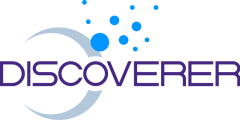Videos
Enjoy watching our DISCOVERER Master Class videos. To view or download the slide presentations, click here.
Masterclass Video 2022
Masterclass Videos 2020
Masterclass Videos 2019
Masterclass Videos 2018
Masterclass Videos 2017
Masterclass 2022
In his last Masterclass for the DISCOVERER project, PD Dr. Georg Herdrich from the University of Stuttgart speaks about the “Current Status of Atmosphere-Breathing Electric Propulsion (ABEP) Developments”, providing examples from the final stages of the DISCOVERER project itself.
Masterclasses 2020
In his second Master Class, Dr. Nick Crisp from the University of Manchester summarises the challenges and opportunities of designing satellites for and flying them in very low Earth orbit (VLEO). A similar lecture was held by the project’s scientific coordinator, Dr. Peter Roberts, at the beginning of the project in 2017 (https://youtu.be/_TeeG0jgG30), so it is of particular interest to watch this new Masterclass in light of the huge steps forward that the DISCOVERER team has made since then.
Here, PD Dr. Georg Herdrich from the University of Stuttgart covers all aspects of technology transfer, from knowledge generation to the transfer of intellectual property (research results and inventions) into patents, and gives examples from the DISCOVERER project itself.
Masterclasses 2019
DISCOVERER coordinator Dr. Peter Roberts and space-engineer Francesco Romano describe the reasons behind the project, the progress made, and critical design decisions.
For this Master Class, we invited Prof. Dr. Holger Kersten from the Scientific Advisory Board (SAB), to speak about diagnostics of ion-beams for space propulsion and industrial surface processing, including plasma/surface interactions, sputtering effects, non-conventional plasma diagnostics, calorimetric (thermal) probes, interferometric force probes, and some elegant experiments conducted in his laboratory. Quite fun!
Prof. Dr. Dhiren Kataria from the Mullard Space Science Laboratory (MSSL) at University College London (UCL) speaks about the use of different mass spectrometry technologies in very low Earth orbit (VLEO) and the scientific reasons challenges behind that. With a special focus on the technology used for the DISCOVERER project, he elaborates on electrostatic analyzers, magnetic analyzers, combinations, and analyzers that can identify different particle species!
Masterclasses 2018
Watch the new DISCOVERER Master Class video on “CubeSat – Attitude and Determination Control System”, presented by Leonardo Ghizoni from GOMSpace.
In this Master Class, Leonardo Ghizoni, a system engineer and project manager at GOMspace (Denmark), explains the details of a “CubeSat Launch and Early Orbit Phase (LEOP)”, using the GOMX-4 twin satellites (constellation) as an example.
Dr. Eelco Doornbos, an Assistant Professor at Delft University of Technology (The Netherlands) and invited guest speaker at the 3rd General Assembly (GA) Meeting of the DISCOVERER consortium, uses elegant videos and animations to explain the physics of the Earth’s thermosphere, magnetosphere, space weather, and satellite aerodynamics based on empirical data derived from the GOCE, SWARM and CHAMP satellite missions.
DISCOVERER consortium member Priv. Doz. Dr.-Ing. Georg Herdrich from the Institute of Space Systems (IRS) at the University of Stuttgart (Germany) provides expert insights into advanced propulsion, new technologies, and future space travel plans. Enjoy!
For this particular Master Class, the DISCOVERER consortium invited the experienced CubeSat engineer Prof. Dr. Mykola Nickolay Ivchenko from the Royal Institute of Technology (KTH) in Sweden to tell his “SEAM story”, meaning the complete story of the CubeSat SEAM from the initial concept, over design, engineering, and troubleshooting, all the way to the launch day! Surprises included…
Masterclasses 2017
In this video, the project’s scientific coordinator, Peter Roberts, explains the basics of satellite technology, and, in specific, very low earth orbit (VLEO) technology, as part of the 2017 DISCOVERER Master Class programme.
Dr. Nick Crisp teaches the basics and an example of spacecraft system modeling as part of the 2017 Discoverer Master Class programme.
Santiago Perez explains the different orbits, and various markets and uses for Earth observation technology as part of the 2017 DISCOVERER Master Class programme.
In this video, Daniel Garcia-Amiñana describes ‘Business Model CANVAS’ and explains how much, in fact, we can learn and apply from successful business models in seemingly unrelated areas, as part of the 2017 Discoverer Master Class programme.
